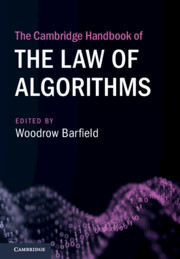Book contents
- The Cambridge Handbook of the Law of Algorithms
- The Cambridge Handbook of the Law of Algorithms
- Copyright page
- Contents
- Figures
- Tables
- Notes on Contributors
- Foreword
- Preface
- Acknowledgements
- Abbreviations
- Part I Introduction and Setting the Stage for a Law of Algorithms
- Part II Business, Regulations, and Decision-Making with Algorithms
- Part III Intellectual Property and Algorithms
- Part IV Criminal Law, Tort Issues, and Algorithms
- 19 The Use of Algorithms in Criminal Adjudication
- 20 Assessing the Risk of Offending through Algorithms
- 21 Injury by Algorithms
- 22 When Do Algorithmic Tortfeasors that Caused Damage Warrant Unique Legal Treatment?
- 23 Tort Law
- Part V Constitutional Law, Human Rights, and Algorithms
- Part VI Applications and Future Directions of Law and Algorithms
- Index
20 - Assessing the Risk of Offending through Algorithms
from Part IV - Criminal Law, Tort Issues, and Algorithms
Published online by Cambridge University Press: 19 October 2020
- The Cambridge Handbook of the Law of Algorithms
- The Cambridge Handbook of the Law of Algorithms
- Copyright page
- Contents
- Figures
- Tables
- Notes on Contributors
- Foreword
- Preface
- Acknowledgements
- Abbreviations
- Part I Introduction and Setting the Stage for a Law of Algorithms
- Part II Business, Regulations, and Decision-Making with Algorithms
- Part III Intellectual Property and Algorithms
- Part IV Criminal Law, Tort Issues, and Algorithms
- 19 The Use of Algorithms in Criminal Adjudication
- 20 Assessing the Risk of Offending through Algorithms
- 21 Injury by Algorithms
- 22 When Do Algorithmic Tortfeasors that Caused Damage Warrant Unique Legal Treatment?
- 23 Tort Law
- Part V Constitutional Law, Human Rights, and Algorithms
- Part VI Applications and Future Directions of Law and Algorithms
- Index
Summary
Risk assessment – measuring an individual’s potential for offending – has long been an important aspect of most legal systems, in a wide variety of contexts. In most countries, sentences are often heavily influenced by concerns about preventing reoffending. Correctional officials and parole boards routinely rely on risk assessments. Post-sentence commitment of “dangerous” offenders (particularly common in connection with sex offenders) is based almost entirely on determinations of risk, as is involuntary hospital commitment of people found not guilty by reason of insanity and of people who are not prosecuted but require treatment. Detention prior to trial is frequently authorized not only upon a finding that a suspect will otherwise flee the jurisdiction, but also when the individual is thought to pose a risk to society if left at large. And police on the streets have always been on the look-out for suspicious individuals who might be up to no good.
Keywords
- Type
- Chapter
- Information
- The Cambridge Handbook of the Law of Algorithms , pp. 432 - 448Publisher: Cambridge University PressPrint publication year: 2020

